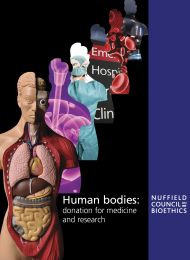Human bodies: donation for medicine and research
Report
Published 10/10/2011

Donated bodily material for medicine and research, such as organs, eggs and sperm, are in high demand, and current levels of donation fall short of need.
This report considers the ethical and social issues that arise when people are asked to donate bodily material (such as organs, blood, eggs and sperm) to benefit others. It sets out guidance to help people consider the ethical acceptability of various ways of encouraging people to donate, both for treatment of others and for scientific research.
In this report we try to answer two questions:
- How far should society go in trying to encourage people to donate their bodily material? For example, is it acceptable to offer people money?
- What is the role of the government and others in responding to the demand for bodily material? For example, how can barriers to donation be removed, and how can the need for donated bodily material be reduced?
The report was produced by an expert working party and focuses mainly on the situation in the UK. In coming to its conclusions, the working party consulted a wide range of people, including members of the public, patient and user organisations, faith groups, academics and researchers, people involved in regulating donation and research, and professionals involved in transplantation and fertility services.

